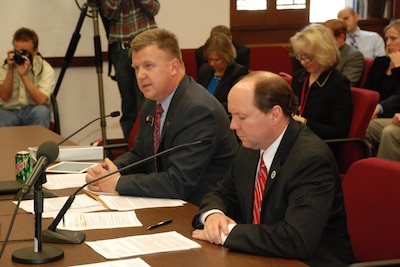A Senate committee has killed a bill that would have allowed school boards to authorize carrying of concealed weapons in schools. The Senate Judiciary Committee’s three Democrats, as expected, voted to kill the bill. The panel’s two Republicans supported the notion of legal guns in schools.

The Monday afternoon hearing on Senate Bill 13-009 was the first of what’s expected to be a long series of gun debates this session, although no other gun bills introduced so far affect schools.
Current state law basically bans weapons at schools, unless carried by security guards or police working as school resource officers. The bill, proposed by Republican Sens. Scott Renfroe of Greeley and Ted Harvey of Highlands Ranch, would have allowed school boards to decide whether to allow teachers and other staff members who have concealed-carry permits to carry their guns at school. Districts would have been able to decide what training to require, and individual employees couldn’t have been forced to carry guns.
The two pitched the bill as an assertion of local control, a deterrent to school shooters and way to allow school employees to assert their 2nd Amendment rights.
A school invader wouldn’t “know who’s carrying” under the measure. “That’s the beauty of this bill,” Renfroe said.
Current law means “the state has said we are going to deny you the constitutional right to defend yourself,” Harvey said.
They repeatedly referred to schools as “gun-free zones” that make students and staff more vulnerable.
“Gun-free zones have not been successful,” Renfroe said.
Harvey kept up a running exchange with committee member Sen. Jessie Ulibarri throughout the three-and-a-half hour hearing. The two repeatedly disagreed about which is the greater danger – a student caught in “direct fire” from a shooter (Harvey’s view), or a student caught in a “cross fire” between a shooter and a staff member (Ulibarri’s position). Ulibarri is a freshman Democrat from Commerce City.
Passions were clearly evident during the hearing, but the discussion was civil. Witnesses representing Ceasefire Colorado, the League of Women Voters and the Colorado Education Association opposed the bill.
A long list of private citizens, gun-group representatives and even a Poudre school board member supported it.
“This is a great discussion and one that needs to be had,” said committee member Sen. Steve King, R-Grand Junction, a former school resource officer who supported the bill.
Committee chair Sen. Lucia Guzman, D-Denver, said the session was “probably one of the best experiences” she’s had during two years in the Senate.
“This is the kind of conversation we should be having,” Guzman said.
She indirectly chided school boards, the State Board of Education and the Colorado Association of School Boards for not coming to the witness table. “I find it interesting we have not heard” from them, Guzman said.
(CASB was neutral on the bill, in keeping with different viewpoints among its membership. Some small rural districts supported the idea because of their distance from police and sheriffs’ offices. And it’s fairly common for interest groups not to testify on a bill whose defeat appears to be preordained.)
“Breakfast after the bell” measure moves ahead
The House Education Committee also had a long afternoon on Monday, working its way through five bills.
The main act was House Bill 13-1006, which would require schools with more than 70 percent free- and reduced-lunch students to provide free breakfast for all students after the start of the school day. Schools would be free to decide how to serve breakfast.
A long list of child health advocates, teachers and administrators extolled the virtues of school breakfasts as a way to keep kids healthy and focused on schoolwork.
The program would be funded by about $28 million in federal reimbursements, and the only discouraging words during testimony came from a couple of administrators concerned that districts might have to pick up part of the tab. They suggested 80 percent might be a safer threshold to meet federal eligibility requirements.
The bill passed 11-2. (Read a staff analysis and description of the bill.)
Here’s a rundown on other committee decisions:
House Bill 13-1056 – This proposal by freshman Rep. Jim Wilson, R-Salida, would create a financial incentive program for small school districts to provide Advanced Placement classes and tests to their students. Several committee Democrats said they liked the idea but were concerned about its original $624,000 price tag. Wilson, a former teacher and superintendent, had an amendment passed to soften that a bit. In the end, a majority of the panel supported the bill, some saying they’d let the House Appropriations Committee decide on the cost issue. (Get more details here.)
House Bill 13-1005 – The committee approved this measure, which would require the state community colleges board to set up 20 short-term pilot programs that would train adults both in basic reading and math skills and in specific vocational fields. (Get more details here.)
House Bill 13-1073 – This bill would have allowed teachers who move to new school districts to waive the non-probationary status (tenure) that they’ve earned previously. The bill was promoted as a way to give teachers more flexibility in finding new jobs. But a Colorado Education Association lobbyist testified against the bill, saying the union is worried the bill would used to force teachers to give up tenure. Several committee members said they were confused by the bill, and others were concerned it would upset the delicate compromises crafted into the 2009 teacher evaluation law. The panel’s seven-member Democratic majority killed the bill.
House Bill 13-1023 – This measure would require school boards to adopt policies on “academic acceleration” for students and was passed unanimously.
[<a href=”//storify.com/EdNewsCO/co-senate-judiciary-committee-jan-28″ target=”_blank”>View the story “CO Senate Judiciary Committee, Jan. 28” on Storify</a>]
